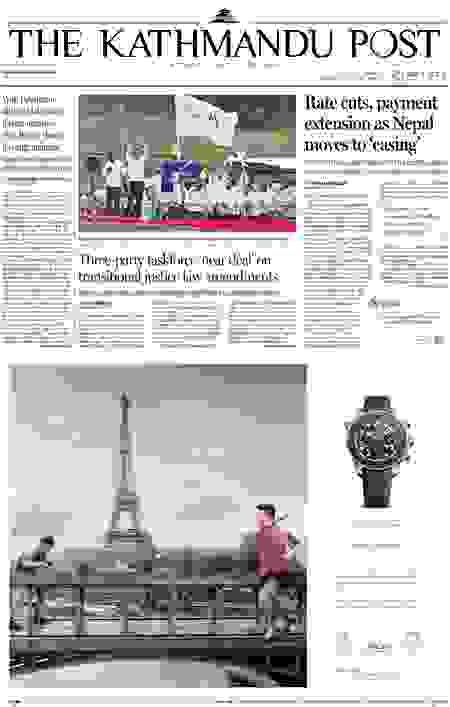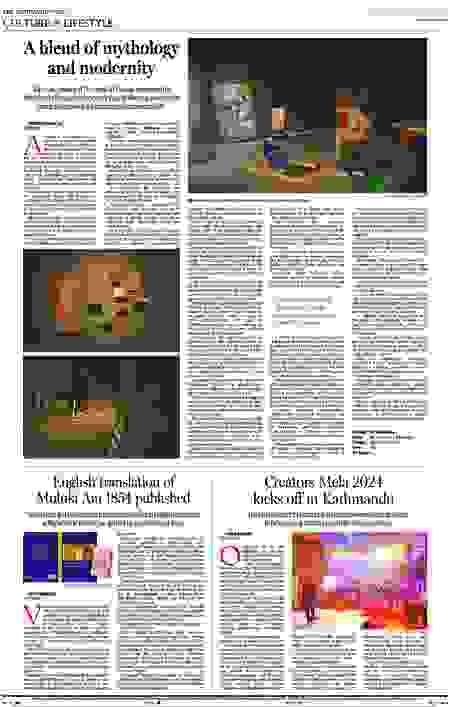Rate cuts, payment extension as Nepal moves to ‘easing’
KATHMANDU, JULY 26
Nepal’s private sector has been sailing in troubled waters.
The central bank responded to the problem experienced for the past
two fiscal years by easing monetary policy and cutting rates to keep credit flowing. For the first time, the bank has admitted that the country suffered an “economic slowdown” for two consecutive years.
The private sector welcomed the monetary policy for the fiscal year 2024–25, unveiled by Nepal Rastra Bank Governor Maha Prasad Adhikari on Friday.
The policy aims to ramp up support for the economy, which has been slowing, said Adhikari. “The policy targets gradual economic recovery by controlling inflation, stabilising interest rates, and ensuring credit demand.”
The central bank said monetary policy had transitioned to an “easing, cautious” mode to address the demand of the private sector, which is the driver of economic growth.
With easing measures, the central bank expects a double-digit private sector credit growth, increasing by 12.5 percent year-on-year in 2024-25.
“The monetary policy is favourable for the private sector. It aims at economic recovery through productive use of private-sector credit,” said Chandra Dhakal, president of the Federation of Nepalese Chambers of Commerce and Industry, the apex private sector body.
“There was a problem. Money had piled up in banks, and businesses were not getting it to invest. The policy has untied the knot.”
The central bank said the private sector pumped Rs5.27 trillion into the economy in the last fiscal year, which ended on July 15. This accounts for 92 percent of Nepal’s economy.
The growth of the construction sector also stalled in the period. In the last fiscal year, the sector, with a contribution of 5.41 percent to the economy, is projected to have dropped to 2.07 percent.
To address the sector’s grievances, the monetary policy has extended the interest payment deadline for contractors to November.
“It’s welcoming, though it is late,” said Rabi Singh, president of the Federation of Contractors’ Associations of Nepal. “But this is just a temporary arrangement.”
“We had recommended the government for recapitalisation of the loans and interest for 2 to 5 years to stabilise the construction industry’s capital structure,” he said.
The government defaulted on payment for contractors, forcing hundreds of projects to halt and eventually cause the construction sector, one of the key economic indicators, to enter a recession.
“Still, we need the assurance of enough cash flow for the development of the critical infrastructure, which is also the basis for jobs creation.”
Singh said the construction sector has been working on projects amounting to Rs600 billion.
The central bank said the measures to cut interest rates are intended to enhance market liquidity and support economic activity in a low-inflation environment.
The upper ceiling interest rate corridor has been decreased by 0.5 percentage points to 6.5 percent, and the policy rate has been reduced by 0.5 percent, to 5 percent.
According to market analysts, if banks’ interest rates are low, people generally tend to invest. This will allow liquidity injections in the market without it being absorbed by the banks and the central bank.
The monetary policy stated that the high liquidity in the banking system would support businesses and individuals and ease the difficulties of the private sector.
The central bank said mobilising the banks’ liquidity through the private sector would support the federal government’s ambitious economic growth target.
“This monetary policy will help us reach the 6 percent economic growth targeted by the federal government by keeping inflation at around 5 percent,” said Governor Adhikari. He said the central bank would manage liquidity and inject capital into the productive sector to achieve the target growth.
According to the annual account estimates by the National Statistics Office, Nepal’s economic growth was estimated at 3.87 percent in the last fiscal year, in an optimistic scenario.
The World Bank said in its April Nepal Development Update that
economic growth is projected to
accelerate to 4.6 percent in the current fiscal year, a way below the government target.
“This recovery is largely attributed to the easing of monetary policy, assuming the productive use of private-sector credit,” the multilateral funding agency said. “Private sector credit contracted in the last fiscal year due to the tighter regulation on working capital loans, high lending rates, and weak domestic demand.”
“The reforms to improve the business environment could attract more private investment,” according to the World Bank.
On Friday, the central bank announced it would review the
current working capital loans guideline. Banks and financial institutions offer short-term working capital
loans to finance a company’s everyday operations.
At present, industrialists and businesspeople get working capital loans of up to 25 percent of their annual turnover.
For those taking more working capital loans than the set threshold, the deadline for borrowers to repay the excess credit has been extended to mid-July 2025. The central bank said it aims to maintain seven months of forex reserves to cover goods and services imports in the ongoing fiscal year 2024-25.
The central bank said it would
coordinate with the government to formulate necessary laws to regulate and supervise savings and credit
cooperatives.
The International Monetary Fund (IMF) has flagged a risk to Nepal’s economy that could trigger social unrest if the ongoing cooperatives problems are not sorted out.
It said that several cooperatives have collapsed in the past six months, causing a loss or freezing of client savings and creating small-scale social unrest. The IMF warned that problems in the savings and cooperatives sector are expanding.
The leading cause of the failure is investment in illiquid and underperforming cooperatives’ assets, which impact repayment capacity, combined with some cases of fraud.
The monetary policy said it would facilitate the government’s initiative to return Rs500,000 to each cooperatives depositor by recovering them from the directors’ properties.
With a growing number of companies being blacklisted, the central bank said it had worked out a policy for the companies that are associated with the blacklisted companies but have not committed any offence.
Under the policy, if one firm is blacklisted in a joint venture, it will not be mandatory to keep the other
in the bad book if it has committed
no offence.
At present, if a person or organisation that is blacklisted owns 15 percent or more shares in any other firm, personally or institutionally, the director and executive head of such a firm or company can also be blacklisted.
The central bank said it would provide collateral-free loans to migrant workers based on the assurance that remittances would be sent to the bank accounts in their home country.
The NRB has extended the deadline for loan repayment to microfinance customers who failed to pay loans under various circumstances.
Monetary policy has increased the limit on home loans. The bank said that the limit on home loans taken for the first time would be increased to Rs25 million from Rs20 million.
It has increased the foreign exchange limit for Demand Draft/Telex Transfer facilities when
importing goods to $50,000 from the existing $35,000.
The existing limit for importing goods through ‘document against payment’ and ‘document against acceptance’ has been increased from $60,000 to $100,000.
The monetary policy has removed the limit on share mortgage loans
for institutions, which is currently Rs200 million.
However, no new provision has been made on personal or individual loan limits. Currently, the share mortgage loan limit for individuals is Rs150 million, and individual share investors have been demanding an increase in this limit.









